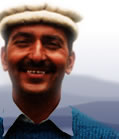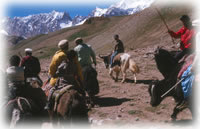 |
 |
||
 |
|||
|
RELATED THEMES politics social change OTHER LOCAL THEMES BACKGROUND |
history
Qurban (Pakistan 28) remarks: "I cannot exactly say how old the settlement of Shimshal is because there is no written history of the village." His son, Inayat (Pakistan 2) explains how in the past the young and old would sit together during festivals and collective work, and in that way history would be told and learnt. Such opportunities are decreasing with so many people residing outside of the village for either education or employment. Nevertheless the history of Shimshal is evidently a topic people enjoy talking about. Many narrators are aware of their own family history but in particular a number of narrators (including Pakistan 5, 13 and 30) relate the story of their key ancestor Mamusing (often referred to as "our grandfather") and how he came to settle in Shimshal. This story is one which has been passed down between generations and the slight discrepancies in accounts are to be expected. It is reported by many that there have been 13 generations since their ancestor Mamusing explored the area of Shimshal and settled there with his wife. There was already evidence of a settlement in Shimshal when he arrived, in the form of man-made water channels. Mamusing's wife was angry with him for bringing her to such a remote place. But a visit to her from a saint served to restore their relationship and they went on to have a son, Sher. Sher was responsible for securing Shimshal's rights over the Pamir pasture area by wining a polo contest against some Kyrgyz herders who also claimed rights over Pamir. Sher chose to ride a yak for the contest, and the yak racing and related customs which take place in Pamir during the summer months seem to echo Sher's victory. Chughbai (Pakistan 13) explains that Sher's three sons are the originators of Shimshal's three main clans: Boqi Kathor, Ghazi Khathor and Bakhti Kathor. Shimshal was part of the royal state of Hunza controlled by the Mir until 1974 when Zulfiqar Bhutto abolished Pakistan's last remaining princely kingdoms. Many narrators can remember life under the Mir's regime. The Mir is reported by some to have held his people back by limiting education and making it difficult for people to gain permission to travel outside Hunza. Shimshal, like other communities in Hunza, was required to provide the Mir with certain agricultural and livestock products as tax payments. In addition, because of Shimshalis' access to rock salt, Shimshal had a special salt tax. These taxes were carried by Shimshalis to Hunza. Baig Daulat (Pakistan 6) provides a very detailed account of the taxes that Shimshalis paid to and carried for the Mir and how this was organised within Shimshal: "Those who possessed livestock and more family members and those on whom God had bestowed wealth were called lopan. They were required to pay yeelban (taxes)… Those who were poor were called borwar (literally, having load; those who carried the Mir's taxes)." However it is important to note that these positions were not fixed statuses. Someone with plenty of livestock and physically strong men in the family could choose to be borwar rather than lopan. At the village level, certain individuals would act on behalf of the Mir in a range of positions including: arbob (the Mir's representative in the village); yarpa (responsible for the Mir's livestock); chorbu (public announcer). Several narrators suggest that the Mir accepted bribes from those in such positions or those who wanted such positions. Having a female relative who had breast-fed one of the Mir's family members could also ensure one obtaining a position: "My uncle Momin Shah was the first yarpa of Shimshal, because his mother's sister had [breast] fed Mir Nazeem Khan's son. So on the basis of this relation my uncle got the yarapgi for the first time" (Pakistan 25). Although the Mir's tax system came to an end in the 1960s, Shimshalis were still not entirely free from carrying loads for others. The Pakistan army came to Shimshal in the late 1960s and was posted in Pamir because of border disputes with China. Many Shimshalis worked as porters for the army. One narrator (Pakistan 20) explains: "we had to take their ration, ammunition from Passu to Quz (a pasture)… the government didn't pay our daily wages directly to our own hands. They had contractors… And these contractors were not honest enough to pay our wages. Sometimes they gave us a piece of cloth instead of the amount and most of the time they paid nothing." Today many Shimshalis work as porters for trekking and mountaineering groups and expeditions. Despite its "remote" location, the testimonies illustrate that Shimshal has a history of interaction with those outside the community. Several testimonies mention contact with people from China in relation to border disputes in Pamir. One narrator (Pakistan 3) explains: "Prior to the Pak-China friendship, our Mirs would request the Chinese for grazing concession in their territory so that they can graze their livestock in Chinese territory. The Chinese normally would grant the permission for a specific period and if this was violated the Chinese would catch them and take them to China for punishment…" quotes about history"…when [my father] was young… 6 or 7 years old there was a teacher in Shimshal from Hunza. He had been sent to teach the people about their religious customs and other traditions. At that time, my father and his friends were the students of that teacher… But the local people felt that if these people became educated they will not obey the orders of the Mir. And so the local rulers and his cronies conspired against the teacher and…he was transferred from the village to Hunza… It was in 1947 or 48 I think." "There was a dispute on the proprietary rights of Pamir between China and Shimshal and my father on his turn was nominated for looking after the yaks at Pamir. He along with his colleagues was imprisoned on the charges that they were grazing yaks in Chinese territory. The Mir of Hunza were on good terms with Chinese; therefore they were released soon…" "…in every family there have been certain persons who have done remarkable jobs... in my family one of our grandfathers named Ramazan… constructed an irrigation channel which resulted in surplus land to our family and he was also an architect and he constructed kongra (tower for observing the sun for the Shimshal calendar). It was one of his greatest works… [But] it caused great loss to our family. Because the design of the kongra…was very similar to the design of the Mir's palace in. The then numberdar reported it to the Mir…[and he] deemed it as an insult and authorised the numberdar to fine my grandfather, and a large portion of our agricultural lands were confiscated as a fine…" "The tax was enforced in the down valley as well. In centre Hunza it was…five kharbal (about 50 kg) wheat grain as tax. In Gulmit village they would give apricot kernel oil for lighting [as tax]… Whereas we would prepare purified cubes of salt and would transport them to Gulmit and the borwar of Gulmit would transport them down to Hunza but they would charge us two goats per house per year as wage for transportation to Hunza." "Other than that already described, there was another tax called "gold tax" and "lead tax". Two yaks per year were given collectively to the Mir as gold tax and a cow per year as lead tax. The turn for gold tax would start at [a household] at one end of the village whereas the lead tax [collection] would function in reverse order… The lead tax was such that it was extracted from the lead mines in Chipursan. Since there was no lead mine in Shimshal, we would give a cow instead of lead to the Mir… The Mirs of Hunza since the establishment of the state were paying [gold] tax to China… it was the reason that we retained the occupation of Raskam (land formerly part of Shimshal's territory which is now part of China) where we would cultivate for the Mir and would also look after Mir's livestock there…" "We faced difficulties and to some extent a comfortable life during the rule of the Mir in Hunza, because the Mir of Hunza never did any sort of cruelty to the people of Shimshal. And the main reason behind that was the people of Shimshal were taking too much care of the Mir by providing him with everything for his daily use like butter, cheese, meat, and other necessities like bat, and palos (local woven carpet made from yak or goat hair)" "…if anybody wanted to seek any favour - employment or zhang (office or responsibility) like arbob or yarpa…they presented yak, two maunds (90kg) of pure ghee, goats, bett (coarse woollen cloth), palos (carpet made of yak and goat hair) and other items to him in order to please the Mir or in other words as a bribe… The Mirs with a short period of time took back their authority from one arbob to another without any reasons. It depended on the "gift" presented by the contended man for the slot of becoming chief of the village." |
|
 Descriptions and references to Shimshal have appeared in various historical accounts, mostly written by western academics or explorers. Shimshalis of course have their own version of their history and the booklet currently being developed by the Shimshal Nature Trust (SNT) will present this in detail. The purpose here is to present the historical accounts and descriptions found in the 34 translated testimonies.
Descriptions and references to Shimshal have appeared in various historical accounts, mostly written by western academics or explorers. Shimshalis of course have their own version of their history and the booklet currently being developed by the Shimshal Nature Trust (SNT) will present this in detail. The purpose here is to present the historical accounts and descriptions found in the 34 translated testimonies.